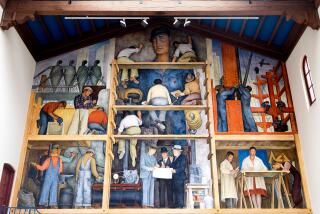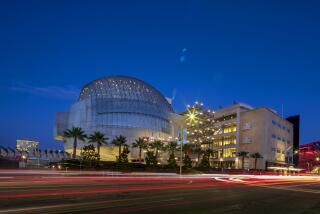Paris’ Arab Institute Faces Hard Times
- Share via
PARIS — The Institute of the Arab World, opened three years ago as a showcase of Arab culture, faces hard times as the Persian Gulf crisis chokes off donations from Kuwait and other major benefactors.
The cultural center, which attracts about 5,000 visitors a day, occupies a stunning building beside the Seine. It was created to promote Western understanding, but turmoil in the Arab world has taken its toll.
France paid most of the $100 million cost of construction for the institute, which contains a research center, auditorium and exhibition halls. France also has provided 60% of the $20 million yearly operating budget, or about $12 million last year.
Under the institute’s founding charter, members of the Arab League were to pay the remaining 40%. Edgar Pisani, the institute director, said only half a dozen of the 21 counties had paid their share, resulting in an Arab debt of $30 million accumulated since 1987.
Pisani said France would not take over the institute’s entire cost.
To keep the center in operation, he has eliminated jobs, cut the budget for buying manuscripts and other materials, and refused to accept exhibitions or cultural events unless outside parties pay for them in advance.
The newspaper Le Monde said one-fourth of the institute staff, about 50 people, has been laid off.
Lack of money has been a problem since President Francois Mitterrand inaugurated the institute in 1987, but things have grown worse since Iraq invaded Kuwait on Aug. 2.
Le Monde reported that Kuwait, which once contributed $1.2 million a year, is paying nothing. It said other major debtors included Saudi Arabia, Iraq, Egypt, Libya and the United Arab Emirates.
Political arguments also have plagued the institute. Insiders accused its first director of hiring a disproportionate number of Lebanese and not giving all member countries equal influence.
“Money is just a pretext; what’s $30 million to a rich gulf state?” said a Lebanese researcher who regularly makes use of the institute’s facilities. “The real problem is politics, the relations among the Arabs.
“The institute has no leadership or direction, and it is not the research center it was supposed to be,” he said, on condition of anonymity. Other research facilities in Paris have more Arabic manuscripts than the institute, he said.
Others argue that because the institute depends on donors, it cannot be an authentic showcase of Arab culture.
“If the library does not have a work which attacks Algeria, even indirectly, if the film library does not have a certain movie that the Saudis don’t like, then all is lost,” Philippe Gardenal wrote in Liberation, a leftist newspaper.
He said Paris could end up with a “sanitized view of the Arab world, just another stop on the itinerary of hurried tourists rushing from the department stores to the Folies Bergeres.”
Saudi Arabia recently canceled an exhibition of photographs about the country, without explanation. Iraq demanded the removal of a Syrian caricature from an earlier display, on grounds the caricature resembles President Saddam Hussein.
Plans had been made for 1991 to be the “year of Morocco.” This was canceled when relations between France and Morocco deteriorated because of a best-selling French biography critical of King Hassan II.
It has been described as one of the most daring and beautiful buildings in Mitterrand’s ambitious state-financed construction program.
More to Read
Sign up for Essential California
The most important California stories and recommendations in your inbox every morning.
You may occasionally receive promotional content from the Los Angeles Times.













